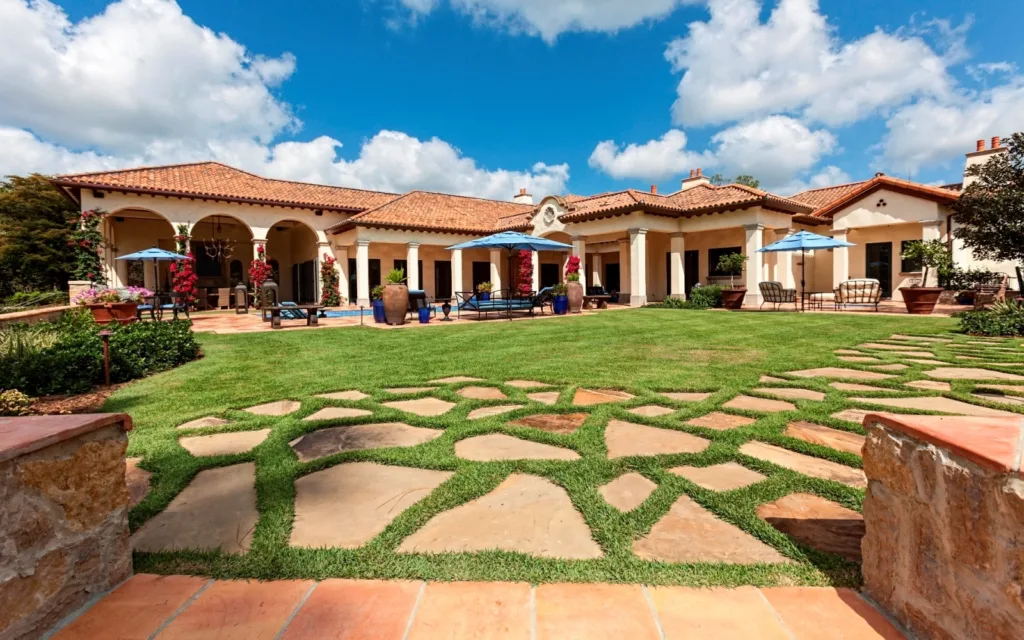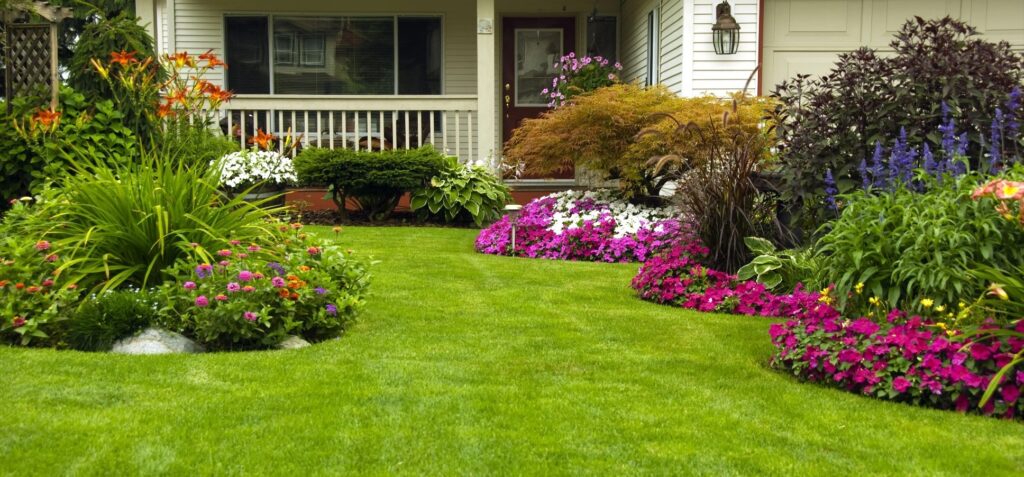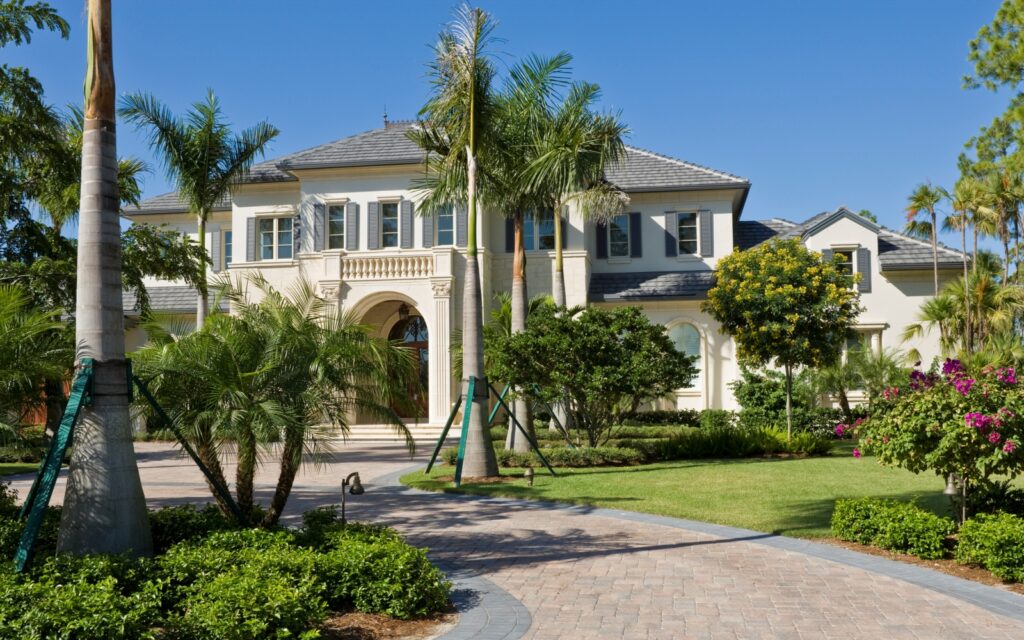
Is professional lawn pest control worth the money in Palm Beach County? It really depends on your situation, but if you are paying for a monthly exterminator then why wouldn’t you want to eliminate the pest control problem before it came into your house in the first place? The best thing about lawn pest control is if when it is done right, it feels like a waste of money because you don’t see the insects or the damage they cause in the first place.
First of all, the ants and spiders that get into your home and cause you problems more than likely came into your home from your yard. When your lawn and ornamental landscaping is free of insects and pests, then there are limited ways for them to get inside where they bother you most.
Secondly, lawn pests cause millions of dollars of damage to sod grasses, landscaping plants and trees each year in Palm Beach County. Just one mature coconut palm tree costs more money to replace than it costs to treat your trees for spiraling whiteflies that can kill them.
When Done Properly, Lawn Pest Control Feels Like a Waste Because You Don’t See the Insects or Damage They Cause
We are a state certified pest control company that has trained pesticide professionals that have been treating West Palm Beach, Palm Beach Gardens, Wellington and Jupiter, Florida residential and commercial lawns and ornamental landscaping for lawn pests for decades and have the expertise to get the job done right the first time at a price you can afford. Using a licensed professional to control lawn pests will give you peace of mind that the job is being done correctly and ensure superior results.
Eco-Friendly and Pet Safe Lawn Pesticide Products Available
We offer natural, environmentally friendly and pet friendly lawn pest control products as an option to our clients. Our experienced technicians can discuss your concerns and the options available to you.
What is the Best Treatment for a South Florida Lawn?

With its tropical climate and plentiful rainfall, South Florida has ideal conditions for growing many things…including a beautiful lawn. But Palm Beach County is also home to many lawn pests and the same conditions that can make your lawn thrive are also ideal for weeds to flourish. So what is the best treatment to keep your lawn lush and green while keeping unwanted weeds and pests from ruining your sod grass?
Tips For a Beautiful Palm Beach County Florida Lawn
- Pick the Right Sod Grass – Sod grasses including St. Augustine, Zoysia, Bahia, and Bermuda are all popular choices and thrive in Palm Beach County, Florida, but there are many subtle differences in pest tolerance, disease tolerance, drought tolerance and fertilization requirements. And if St. Augustine sod grass is a requirement in your community look into a variety that is resistant to Sugarcane Mosaic Virus like Palmetto type St. Augustine sod.
- Irrigation – Even though the sunshine state gets plenty of rainfall each year, proper irrigation is an important step in maintaining a healthy South Florida lawn. To encourage strong root growth, it is advised to use plentiful infrequent watering over frequent light watering.
- Lawn Fertilization – Proper fertilization is crucial to feed your Palm Beach County lawn essential nutrients that may be missing in the sandy soil of South Florida.
- Soil Testing – The only way to properly understand what nutrients are lacking in your soil is to perform a soil test. Soil tests can also detect diseases that can’t be determined by the naked eye
- Weed Control – Weeds crowd out the desirable sod grass and can spread seeds that will quickly multiply if left unchecked. A quality pre-emergent herbicide should be applied to prevent weeds from multiplying while post-emergent can be used carefully on existing weeds.
- Pest Control – Palm Beach County is home to many lawn and landscaping pests that cause millions of dollars in damage a year in damage to sod grasses. Most of these pests can be easily treated, but early detection is essential to limit loss. A professional lawn pest control company can manage any problems too big for you to handle on your own.
In summary, the best treatment for your South Florida lawn is a combination of proper fertilization, weed control and pest control. Combined with proper irrigation, disease management and lawn maintenance, these simple things will give you a beautiful, lush, green lawn that you can enjoy year-round.
Why not leave your lawn treatment problems to a professional. Our locally owned and operated company can keep your lawn looking great with complete professional lawn fertilization and pest control service. We have been treating West Palm Beach, Palm Beach Gardens, Wellington and Jupiter, Florida residential and commercial lawns for decades and have the experience to get the job done right.
We offer natural, environmentally friendly and pet friendly lawn weed control products as an option to our clients. Our experienced technicians can discuss your concerns and the options available to you.
How To Control Doveweed in St Augustine Grass in South Florida?

Doveweed, or Murdannianudiflora, is a common broadleaf weed in South Florida that thrives in moist, wet areas of your lawn and landscaping and can be one of the more difficult lawn pests to get rid of. Areas of your lawn that have poor drainage or leaking irrigation lines are particularly susceptible to doveweed infestations.
To control doveweed in your South Florida St. Augustine sod grass it is recommended you use a pre-emergent herbicide containing prodiamine. When applied properly pre-emergent herbicides prevent the weed’s seeds from germinating and spreading to new areas. Smaller infestations can be dealt with by spot applying an appropriate post-emergent herbicide that is safe to use around St Augustine sod grasses. Severe infestations of mature doveweed are extremely difficult to deal with and it might be best to call in a professional. In the worst cases complete removal and re-sodding may be advisable.
Pre-emergent Herbicides Containing Prodiamine are the Best Way to Control Doveweed in St. Augustine Turf Grass in Palm Beach County
Roundup® is a herbicide product that will kill just about everything green, so be careful when using this product as it will damage your lawn and ornamental landscaping plants as well.
Doveweed, like all other types of weeds, will compete with your lawn’s sod grass for nutrients and water. So once again the thicker and healthier your lawn is, the harder it is for doveweed to gain a foothold in the first place. Professional lawn treatment that includes fertilization service and pest control combined with weed control is the best way to maintain a healthy, beautiful lawn in Palm Beach County.
Why not leave your doveweed problems to the professionals. Our locally owned and operated company can keep your St. Augustine lawn looking great with complete professional lawn treatment that includes weed control service done by highly trained technicians. We have been treating West Palm Beach, Palm Beach Gardens, Wellington and Jupiter, Florida residential and commercial lawns for over 25 years and have the know-how to get the job done right.
We offer natural, environmentally friendly and pet friendly lawn weed control products as an option to our clients. Our experienced technicians can discuss your concerns and the options available to you.
Gray Leaf Spot Lawn Disease Treatment & Prevention in South Florida

Gray leaf spot is a common lawn disease in South Florida that affects St. Augustine sod grass more than other types of warm season grasses. Gray leaf spot is brought on by the Pyricularia grisea fungus and is recognizable by the oblong spots with gray centers on the individual blades of grass. In time, the disease thins out enough blades where it is easily noticeable and if left untreated eventually will kill off large sections of your South Florida lawn. Gray leaf spot fungus thrives in the hot, rainy months of Palm Beach County and prolonged periods of wetness will increase the likelihood of the disease spreading. Catching this lawn pathogen early is key to minimizing damage.
St. Augustine Sod Grass is Highly Susceptible to Gray Leaf Spot Lawn Disease
The best prevention for gray leaf spot disease is to maintain a healthy lawn with proper fertilization, irrigation and removing any excess buildup of thatch that may contribute to drainage issues. Aeration, preventative fungicides and soil amendments can also be very beneficial if gray leaf spot is an ongoing problem. Poor air circulation, poor drainage and anything that causes prolonged moisture in your lawn will increase the likelihood of grey leaf spot disease. Run irrigation systems in the early morning so your lawn has time to dry naturally in the sun and breeze.
Will Gray Leaf Spot Disease Go Away Without Treatment?
Gray leaf spot fungus doesn’t like dry, cold weather, so it may disappear during the winter. But this is a lawn disease that is easily treatable and can cost you a lot of money if it kills large patches of turf grass, so you should take care of any gray leaf spot fungus when you first notice any symptoms. In recurring problem areas, use a preventive fungicide in the early spring to try and avoid it altogether.
Do Fungicides Work on Gray Leaf Spot Disease?
Yes! Gray leaf spot disease is easily manageable with the use of the proper fungicides. And again, in recurring problem areas, use a preventive fungicide in the early spring to try and avoid it altogether.
Why not leave your lawn fungus problems to a professional? Our highly trained pest control and fertilization technicians have been keeping the lawns of West Palm Beach, Palm Beach Gardens, Wellington, Jupiter and other Palm Beach County, Florida cities lush, green and fungus free for over twenty five years.
Year Round Lawn Treatment & Pest Control Spraying South Florida

This is South Florida and lawn and landscape pests don’t take the winters off. Your lawn and ornamental landscaping will go through some changes during the South Florida seasons and St. Augustine sod grass does go into hibernation when it is consistently below 65 degrees, but for the most part they don’t stop growing. And the southern chinch bug, the pest that just loves to make a meal out of your St. Augustine sod grass, is active year-round in South Florida. They might prefer the sunny, warm weather of summer, but they can still cause major damage year-round.
Many Outdoor Lawn Pests are Active Year-Round in Palm Beach County Including:
Lawn fungus and the diseases caused by them are active year-round too. So while you may be used to trading in the gardening equipment for a snow shovel up north, in South Florida you need to keep your lawn treatment up year-round.
Our lawn and ornamental landscape pest control company has trained pesticide professionals that have been treating West Palm Beach, Palm Beach Gardens, Wellington and Jupiter, Florida residential and commercial lawns and landscaping for chinch bugs and other pests for decades and have the expertise to get the job done correctly. Using a licensed professional to control lawn pests will give you peace of mind that the job is being done correctly and ensure superior results.
100% Satisfaction Guaranteed
The tropical climate of South Florida is tough on your lawn and ornamental landscaping, but for over twenty five years our locally owned and operated pest control company has been keeping the residential and commercial lawns and landscaping of West Palm Beach, Palm Beach Gardens, Jupiter, Wellington and other Palm Beach County, Florida cities pest free.

Give Us a Call Today for a Free Estimate!
(561) 844-0422
What is the Disease Killing Floratam Grass in South Florida?

Lethal viral necrosis, also known as LVN, which is brought on by the sugarcane mosaic virus can kill an entire Floratam sod grass lawn within a few years of infection. Sugarcane mosaic virus is caused by a pathogen and has been known to be transmitted from one lawn to another by infected lawn maintenance equipment. Floratam has been one of the top varieties of St. Augustine sod grass since the early 1970s and is widely used in Palm Beach County lawns, but unfortunately Floratam is particularly vulnerable to this virus. Bermudagrass and bahiagrass are also susceptible, but to a lesser extent.
There is Currently No Known Cure for Sugarcane Mosaic Virus
Floratam is a variety of St. Augustine grass that is extremely popular for West Palm Beach, Palm Beach Gardens, Wellington, Jupiter and other Palm Beach County, Florida lawns. But there are other choices when it comes to St. Augustine sod grasses. Palmetto and bitterblue are both varieties of St. Augustine grass that are more resistant to sugarcane mosaic virus and make a fine choice to replace Floratam. The state of Florida even suggests using Palmetto type St. Augustine sod for this very reason.
If St. Augustine sod isn’t a requirement in your Palm Beach County community, Zoysiagrass might also be a good choice as it does not seem to be susceptible to virus.
100% Satisfaction Guaranteed
For over twenty five years our locally owned and operated company has been providing professional lawn disease treatment and fungus control keeping the residential and commercial lawns of West Palm Beach, Palm Beach Gardens, Jupiter and other Palm Beach County, Florida cities lush, green and disease free.

Give Us a Call Today for a Free Estimate!
(561) 844-0422
I Can Fertilize My Own South Florida Lawn, Why Should I Hire a Professional?

Considering fertilizing your own Palm Beach County lawn? It can save you money, but there are many benefits to having a licensed professional do it for you. South Florida’s climate is tough on lawns and proper fertilization, pest control and disease detection are critical in maintaining the density and health of your lawn. Our trained experts understand where to apply spray or granular fertilizer to maximize replenishing the nutrients into your lawn and ornamental landscaping where it will grow stronger roots, and become more resistant to pest and diseases.
The lawn fertilization experts at or company know which fertilizers will deliver the best results for your particular South Florida lawn and the best time to apply them for maximum results. They have years of experience in detecting lawn pest infestations and diseases before they overwhelm your lawn. And they have access to state of the art equipment and spray trucks to make doing the job right easier and faster.
Keep in mind that just because a professional lawn fertilization service is a well-known national company you recognize doesn’t necessarily mean the person that shows up at your house will be an expert. With our locally owned and operated company you get decades of combined experience in the use of proper lawn and landscape fertilizers and pesticides and we stand behind our work with a 100% satisfaction guarantee.
Having a beautiful lawn doesn’t just add curb appeal to you Palm Beach County home. Some HOAs and towns will fine you for dead and unsightly sod.
Sure, you can fertilize your own lawn, we are here to make your life easier.
Torpedograss Weed Control in South Florida

Torpedograss, also known as Panicum repens, is classified as a Category I invasive weed by the Florida Invasive Species Council (FISC) and is extremely hard to get rid of once it has established itself in your Palm Beach County lawn and landscaping beds. The designation means that the weed alters native plant communities through its impact to the environment. This noxious weed is one of the most invasive grassy weeds and is also referred to as coastal bermuda grass, bullet grass, couch panicum, dogtooth grass, quack grass, wainaku grass and other names. Torpedograss loves wet soil and thrives around lake shores and other wetland areas.
Torpedograss is sometimes mistaken for a similar-looking grass called maidencane, which is native to Florida and therefore not considered an invasive species. Maidencane is a common grass in Palm Beach County wetlands that also thrives in wet soils.
Post-Emergent Herbicides are the Most Common Method of Torpedograss Control
Getting rid of torpedograss can be a daunting task. Hand pulling and hoeing tend to leave unseen or fragments of the rhizomes which will quickly regrow. In large infestation these methods are also time consuming and in many cases impractical. Post-emergent herbicides are the most common method of torpedograss control, but unfortunately these products also will harm St. Augustine sod grasses. There are effective a selective post-emergent herbicides that work on torpedograss in lawns with zoysia and Bermuda sod grasses, but there really is no truly effective chemical control for torpedograss in St. Augustine sod grass that doesn’t also harm the turf.
Roundup® is a herbicide product that will kill just about everything green, so be careful when using this product as it will damage your lawn and ornamental landscaping plants as well.
Torpedograss, like other weeds, competes with your lawn’s sod grass for nutrients and irrigation. So once again the healthier and thicker your lawn is, the harder it is for torpedograss to thrive in the first place. Professional lawn treatment that includes fertilization service and pest control combined with weed control is the best way to maintain a healthy, beautiful lawn in Palm Beach County.
Why not leave your torpedograss weed problems to the professionals. Our locally owned and operated company can keep your lawn looking great with complete professional lawn treatment that includes weed control service. We have been treating West Palm Beach, Palm Beach Gardens, Wellington and Jupiter, Florida residential and commercial lawns for decades and have the experience to get the job done right.
We offer natural, environmentally friendly and pet friendly lawn weed control products as an option to our clients. Our experienced technicians can discuss your concerns and the options available to you.